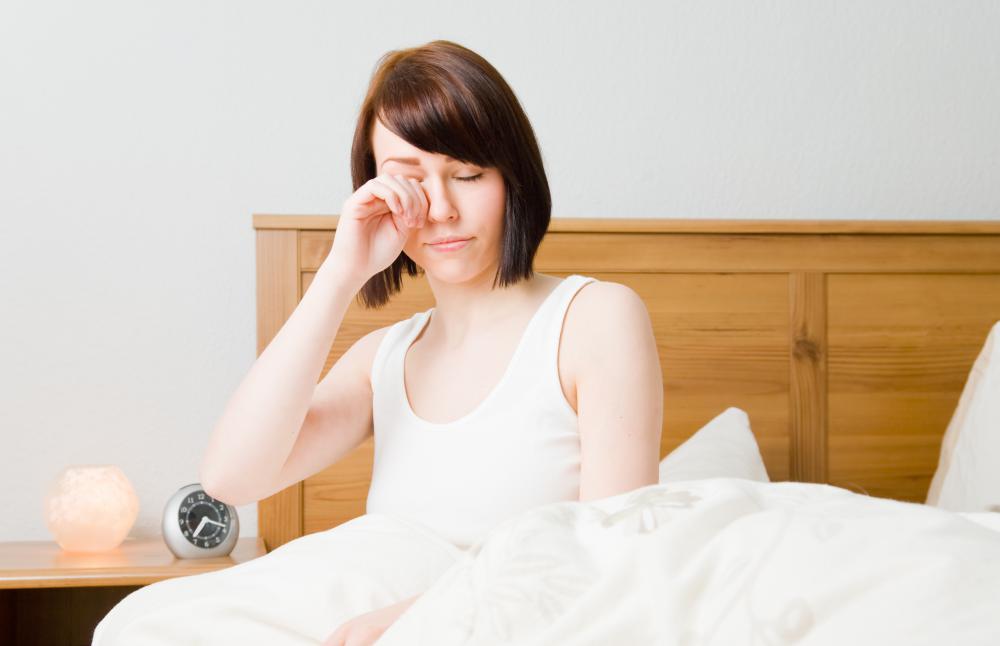At WiseGEEK, we're committed to delivering accurate, trustworthy information. Our expert-authored content is rigorously fact-checked and sourced from credible authorities. Discover how we uphold the highest standards in providing you with reliable knowledge.
What are Anxiety or Panic Attacks?
A panic attack is an anxiety attack at its worst. These episodes are marked by extreme physical, emotional and mental panic or terror, usually focused around an abnormal fear. Symptoms of an attack are often compared to the "fight or flight" sensation of the entire body being on edge as if danger is at hand.
A panic attack may start as generalized anxiety, a feeling of unease that builds into extreme physical symptoms, or it may strike out of the blue. You may even awake from a sound sleep in the midst of an attack. Most attacks last anywhere from 20 minutes to an hour and gradually subside.

Often, these episodes will strike when one is engaged in a mundane activity like driving or shopping. Over a period of time these activities might then become feared and avoided, resulting in limitations or phobias. If one tries to engage in these feared activities, worrying about having an attack can bring one on. Thus panic disorders like agoraphobia can develop.
The physical symptoms of a panic attack might include any or all of the following:
- Heart palpitations
- Increased blood pressure
- Hot flashes or chills
- Shortness of breath
- Dizziness or spaciness
- Nausea
- Sweating
- Feeling faint
- Facial ticks
- Trembling
- Chest pains
- Tingling in muscles
- Fear of losing control and humiliating yourself
- Fear of a heart attack
- Fear of losing your mind
- Fear of dying

As physical symptoms build, they trigger more panic and fear that feeds the episode. The body releases chemicals into the system like adrenaline, sodium lactate and cortisol which are stimulants designed to help put the person in a flee or fight state. At this point the person having the attack becomes more worried about their physical symptoms than whatever it was that triggered the attack. They often start asking themselves things like, "What's wrong with me? Am I having a heart attack? Am I going to faint? Do I have a brain tumor?" People who don't know they are experiencing a panic attack will often go to the hospital truly believing they are dying.

These attacks, along with anxiety disorders, are thought to be genetic and biochemical, and are found in children as well as adults of all ages. Many people who experience these episodes do not recognize them for what they are and are afraid or embarrassed to seek help. These attacks are not harmful in and of themselves, and do not lead to heart attacks, loss of control, mental illness or death. However, they do impact quality of life and can be very debilitating to those who suffer from them, severely limiting their activities and enjoyment of life.

Prolonged anxiety, along with panic episodes can lead to reduced self-esteem and self worth. This general lack of well-being can affect levels of certain neurotransmitters in the brain, like serotonin, which moderates mood. With lower levels of serotonin, depression and negative thinking can set in. For this reason depression is often found alongside anxiety disorders.

These attacks and generalized anxiety are very common and are treatable a variety of ways. Antidepressants are often prescribed, and cognitive behavioral programs that offer tools for overcoming limitations and understanding these episodes are also effective, like that offered by the renowned Midwest Center for Stress and Anxiety. Diet plays its own part in curbing panic and anxiety, especially elimination or marginalizing of sugar and caffeine.

It is estimated that 3-6 million Americans suffer from panic disorder every year and about one third of the population will experience a panic attack at some point in their lives. If you have been experiencing these episodes, generalized anxiety or depression, talk to your physician about the options that are best for you.
AS FEATURED ON:
AS FEATURED ON:




















Discussion Comments
I usually find that the best way to deal with panic attacks is to have someone supportive and reassuring with you. I try to avoid medication and just focus on breathing and controlling myself. It is hard, but if you have someone to help you through it, to comfort and reassure you, I find I can gain control and calm down within 10-15 minutes.
My symptoms usually involve hyperventilating, crying hysterically, hallucinations, shaking and rapid heart beat. Sometimes I get nausea and vomiting. Occasionally hyperventilating will make me pass out.
I agree with @softener. If you do have to take medication however, I’d be very careful with any of the “heavy” anti-anxiety medications like Xanax or Valium. It’s true that they’re probably the most effective medications of their kind, but prolonged usage makes you highly likely to develop a tolerance to the effects, meaning you’ll need to keep increasing your daily dosage. If the amount you're taking gets too high and your doctor decides it’s time to try something else you’ll have to deal with some very unpleasant withdrawal effects.
There’s an over-the-counter herbal medication known as Kava which some studies have shown to be just as effective as medications like Xanax. I’ve tried both and I feel much safer taking Kava and I find it to be more effective as well.
@Sequoia - It’s important to remember that medication won’t completely solve the problem and if you can avoid having to take it then that is much more preferable than having to deal with possible side effects. There are a few things you can try as an alternative to prescription medications, like natural herbal supplements, B vitamins and amino acids. Developing strong coping mechanisms is important too, so continue with therapy if that’s an option.
I've tried a lot of different treatments for panic attacks including cognitive behavior therapy and different antidepressants but I'm still suffering. The antidepressants I was on were effective some of the time but the side effects were hard to put up with. I'd feel tired all of the time and foggy minded and it interfered with my life almost as much as the panic attacks did. I know medication is kind of trial and error but nothing seems to be working, can anyone offer any advice?
Post your comments